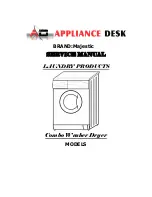
8
Crockery that may be suitable
There are limitations for the following parts
-
Only wash earthenware crockery in the dishwas-
her if the manufacturer has expressly indicated
that it is suitable.
-
Some glazed finishes may fade after frequent ma-
chine washing.
-
Silver and aluminium parts tend to discolour during
machine washing. Many food residues such as
egg white, egg yolk, mustard often cause discolou-
ration and/or staining on silver. Food residues
should be cleaned from crockery or cutlery straight
away if it is not going to be washed immediately af-
ter a meal.
-
Some types of glass may become cloudy after
many washing cycles.
When buying new crockery, glasses and cutlery, con-
firm that they are dishwasher-proof.
Disposal
Packaging
Our dishwashers require effective protective packa-
ging in transit. In doing this, however, we limit oursel-
ves to what is absolute necessary.
Warning! Packaging parts (e.g., foil, styrene
foam) can be dangerous for children due to the
danger of suffocation! Keep packaging parts
away from children.
All packaging materials used are environmentally-
friendly and reusable.
The cardboard parts are made from recycled paper,
and the wooden parts are untreated. The plastics are
marked as follows:
«PE»
for polyethylene, e.g., packaging foil
«PS»
for polystyrene, e.g., padding (basically
CFC-free)
«POM»for polyoxymethylene, e.g., plastic clamps
By the recycling and reuse of packaging, raw materials
can be saved, and the volume of waste reduced.
Give the packaging to your local recycling centre for
reuse. Your municipal or local authority will give you
the address.
Old appliances
When your appliance needs replacing, or is withdrawn
from service, you should render it unserviceable be-
fore having disposing of it.
Warning! Children at play could lock themsel-
ves inside your appliance (danger of suffoca-
tion) or otherwise endanger themselves. Al-
ways therefore pull out the mains plug. Cut
through and discard the mains cable. Disable
the door lock so that the door no longer closes.
Marking of plastic parts for graded recycling:
All plastic parts in your appliance are marked with in-
ternationally standardised abbreviations (e.g., «PS»
for polystyrene). When you dispose of your machine,
this enables the plastic waste to be sorted into graded
plastic balls for environmentally-conscious recycling.
Take your old appliance to your local recycling centre.
Your local Council or Environmental Health Office will
advise you of your nearest recycling centre.









































